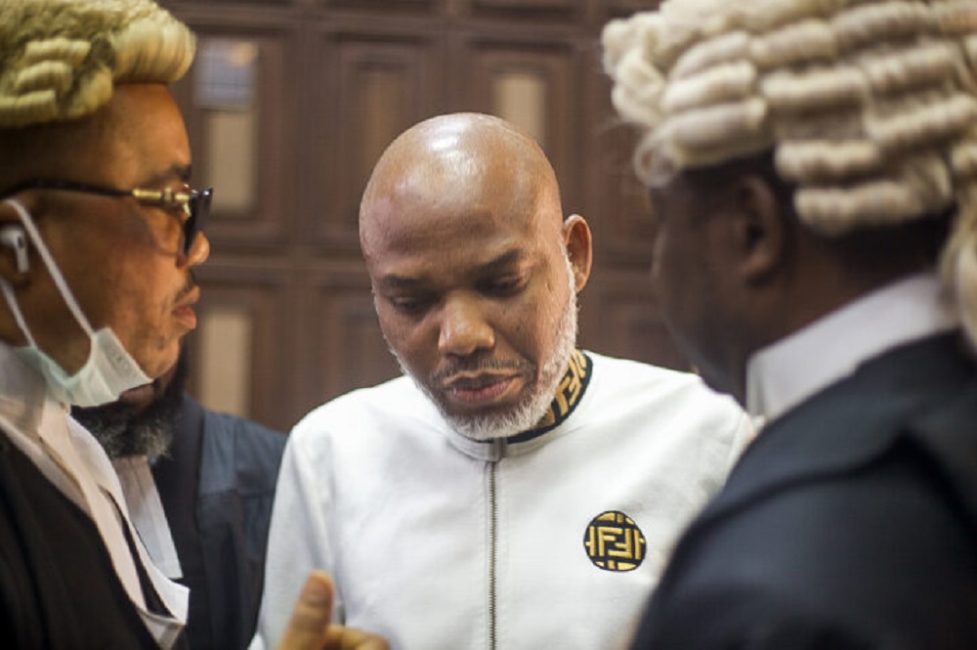Nnamdi Kanu: Lawyers Disagree On CJ’s Power To Direct Secret Trial Of Terrorism Cases
Legal practitioners are not on the same page with regards to the new Federal High Court Practice Direction 2022 in which the Chief Judge, John Tsoho, strictly prohibited coverage of terrorism proceedings except as approved by the court.
The direction which was issued to THE WHISTLER on Thursday states that terrorism cases “shall be held in camera”, that is, in private before the trial judge and in absence of the press.
Advertisement
The CJ had said that the approval is based on his constitutional powers as enshrined in section 254 of the Constitution of the Federal Republic of Nigeria (1999 as amended).
The new rule was made public a day before the ruling on the application filed by the leader of the Indigenous People of Biafra, Nnamdi Kanu, challenging the competency of the 15-count terrorism-related charges instituted against him by the federal government.
Justice Binta Nyako had struck out 8 of the 15 count charge while adjourning to May 16 and 28 for ruling on Kanu’s bail application and continuation of trial.
She also made it clear to counsels for the respective parties that she is “ going to explore that opportunity” in the new practice direction vis-a-vis the infraction the matter brings on other court rooms as well as the security implication it imposes on the roads leading to the court.
Advertisement
But Constitutional Lawyer, Festus Ogwuche, told THE WHISTLER that the constitutional requirement for open or public trial can only be abridged in the manner prescribed by the Constitution itself, and not through a Practice Direction as done by the CJ.
He opined that the trial court should be wary of infringing on the fundamental right of people and the press who are supported by international instruments to observe proceedings.
“It is a grave misnomer that a mere Practice Direction would be applied to alter a notable imperative for a fair trial under the Constitution and one wonders if our jurisprudence is geared backwards. You may change the venue of judicial sittings or put in place security measures that may restrain free movement of individuals on days that such matters are slated, but definitely not by a practice direction that seeks to circumvent a fundamental right!,” he stated.
He further argued that only constitution amendment can guarantee several sections in the new practice direction.
“The CJ of the Federal High Court ought also to have put into consideration the fact that the requirement for a public trial is one entrenched in several international human rights instruments as global standards of criminal trial or adjudication and I seriously wonder how his Practice Direction would impact to render the guarantees under the instruments impotent.
Advertisement
“Not in that circumstance, not even the National Assembly can make such law, as it clearly lacks the capacity legislatively, unless by way of a constitutional amendment. But then such amendment would also be an uphill task considering also that the legislature cannot make law that impinges against the fulfilment of the country’s international obligations,” he added.
Ogwuche recommended the immediate withdrawal of the new practice direction “as quickly as possible and save ourselves serious embarrassment before the comity of nations.”
However, Oluwaleke Atolagbe, an Assistant-Counsel, International Criminal Court, Hague, told our correspondent that he does not see anything strange with the new Practice Direction on the prosecution of Terrorism cases because Section 254 of the Constitution of the Federal Republic of Nigeria, 1999 (as amended) expressly empowers the Chief Judge of the Federal High Court to make such Practice Direction.
He also stated that the direction is in order because Section 232 of the Administration of Criminal Justice Act provides thus: “A trial for the offences referred to in subsection (4) of this section may not, where the court so determines, be held in an open court.”
He recalled that in 2019 during the prosecution of Murtala Nyako, a former governor of Adamawa State, under the Law Firm (Rotimi Jacobs, SAN & Co.),on behalf of the Economic and Financial Crimes Commission, “we called one of the Prosecution witnesses who testified via video link in accordance with the provision of Section 232 of the Administration of Criminal Justice Act, 2015.”
He argued that the exclusion of the public in a criminal trial is permitted under Section 36 of the 1999 Constitution (1999 as amended).
Advertisement
He added that since the new direction has been activated with immediate effect, parties and lawyers who do not agree with certain provisions in it should file a court action against it.
“However, I am of the view that if anyone is aggrieved with the exclusion of the public or if anyone thinks such exclusion is not justified or cannot be situated within Constitutional provisions then such a person may approach the court for redress,” he said.



